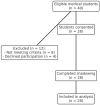"Walking a Day in My Shoes": A Clinical Shadowing Program to Enhance Medical Students' Understanding of Chronic Disease Management Beyond Clinical Settings
- PMID: 40422275
- PMCID: PMC12109920
- DOI: 10.3390/clinpract15050094
"Walking a Day in My Shoes": A Clinical Shadowing Program to Enhance Medical Students' Understanding of Chronic Disease Management Beyond Clinical Settings
Abstract
Aims/background: Medical education is largely clinical and biomedical with little emphasis being put upon the social determinants of health (SDH) and patient-centredness. A programme entitled "Walking a Day in My Shoes" was devised as a pilot cohort study with the view of evaluating the impact of a clinical shadowing experience upon the empathy, SDH awareness, and patient-centredness of medical students.
Methods: A prospective cohort study, involving 28 final-year London-area medical students, employing a three-phase teaching programme comprising preparation, observation, and reflection was carried out. Students' confidence in the management of non-medical barriers, SDH awareness, and empathy before and after shadowing were measured using pre- and post-shadowing questionnaires. Qualitative analysis of patient feedback and journals also occurred.
Results: Statistically significant improvements were observed in students' empathy (mean score increase from 6.8 to 8.9, p < 0.001), understanding of SDH (advanced comprehension rose from 35% to 93%), confidence in addressing non-clinical barriers (from 39% to 86%), and awareness of logistical challenges (from 31% to 81%). Qualitative analysis highlighted key themes, including systemic barriers (transportation, polypharmacy, and social isolation) and students' increased awareness of the emotional toll of chronic illness. Patients expressed high satisfaction, with 97% agreeing that the programme improved students' understanding of chronic disease management. These findings suggest the programme's practicality and scalability in medical education.
Conclusions: This pilot cohort study demonstrated the significant enhancement of the students' empathy, perception of SDH, and patient-centredness preparation through immersive shadowing. The findings support the use of experiential learning programmes as curricular interventions.
Keywords: empathy; experiential learning; medical education; patient-centred care; social determinants of health.
Conflict of interest statement
The authors declare no conflicts of interest.
Figures



References
-
- World Health Organization . Integrating the Social Determinants of Health into Health Workforce Education and Training. World Health Organization; Geneva, Switzerland: 2023.
-
- General Medical Council Outcomes for Graduates. 2018. [(accessed on 20 November 2024)]. Available online: https://www.gmc-uk.org/-/media/documents/outcomes-for-graduates-2020_pdf....
-
- Rosenthal J. In: Learning General Practice. Harding A., Hawthorne K., editors. Royal College of General Practitioners; London, UK: 2018. [(accessed on 17 September 2024)]. Available online: https://www.rcgp.org.uk/getmedia/074af536-aaae-4eef-95cb-63ee18e96fda/le....
LinkOut - more resources
Full Text Sources

